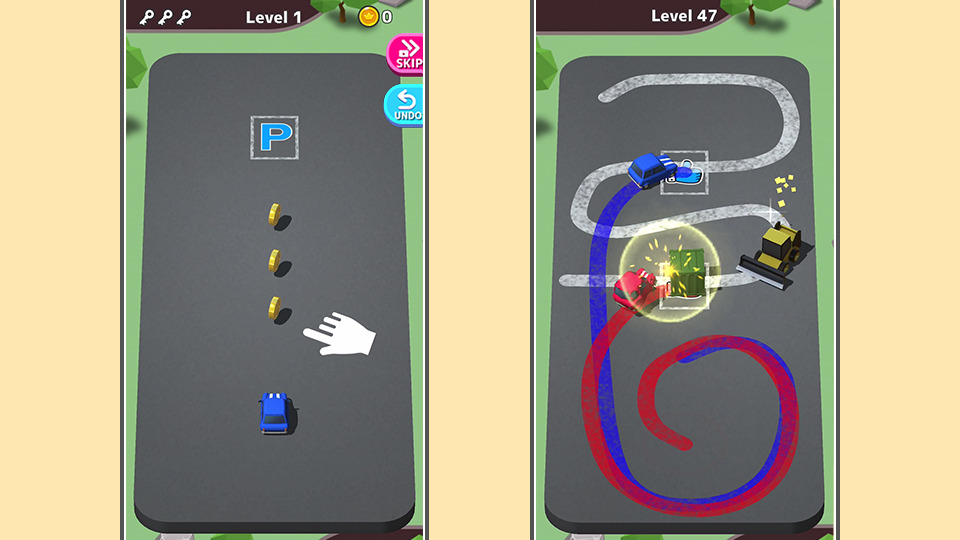Gaming, Mobile App Growth
Ask the Developer: Kayac on Reaching #1 With Park Master
Mar 4, 2020

Gaming, Mobile App Growth

In our Ask the Developer series, we interview developers for insight into their strategies and best practices. In this installment, we spoke with Yudai and Takashi from Japanese game developer Kayac, about their journey to reaching #1 in the charts with their game Park Master.
A: We became interested in developing hyper-casual games in summer of 2018, right around the same time hyper-casual games were becoming popular among Japanese developers. Kayac asked internal employees to come up with ideas for a hyper-casual game, ultimately choosing one team’s idea. The game was eventually released but did not do well and the team was disbanded.
Kayac has nearly 300 employees total, but our team behind Park Master is a lean team of only five people. Two of us started creating hyper-casual games as a side project for fun, outside of work in early 2019. Later in the year, it became an official Kayac project when the company decided to invest and bring in three more team members. We were new to hyper-casual games and had little knowledge about the specifics, especially around monetization — so, we decided to enlist AppLovin’s help.
A: I think the simplicity of our game was vital to our success. If a user doesn’t understand how to play a game just by looking at an ad, they won’t install it. So, we made sure our game appealed to everyone and was straightforward.
Cars are universal — if you see a parking lot and a car, your first reaction would be to park the car — which is the objective of our game. Also, it’s easy to understand what you shouldn’t do in our game. Everyone knows you shouldn’t crash into other cars! Due to this common ground that translates across cultures, we were able to lead users who saw our ads to install Park Master, as they understand the game within a matter of seconds.

In our testing phase, we just took screenshots of gameplay to use as ads. We purposefully didn’t create video ads in this phase because we wanted to measure the true potential of our game.
We created our own ads, but turned to AppLovin to help us later on in the process. Park Master was struggling in December 2019 — we had shot up to #3 in the charts briefly, but we weren’t able to maintain that position for very long. Our position quickly dropped to #300, along with our hopes. However, in January 2020 we attended AppLovin’s Amplify workshop in Tokyo, where we learned valuable insights and met with their in-house design team, SparkLabs. They gave us some pointers regarding our ads and after implementing their advice, our impressions per mille (IPM) increased by 50%! Our game reached #1 in the charts shortly afterward.
A: When we first started in the hyper-casual gaming space, Park Master showed us we had a lot to learn on how to create and launch a successful game. AppLovin supported us from start to finish, not only in regard to user acquisition and monetization, but also in educating us about the hyper-casual game space as a whole For hyper-casual games, it’s very important to be data-driven in your approach. We need to constantly collect and analyze data throughout the game development process, which AppLovin helped us do.
We also integrated in-app bidding with MAX by AppLovin. We continuously A/B tested functionality within MAX and implemented suggestions given by the AppLovin team, which allowed us to continue increasing our ARPDAU.
A: We think hyper-casual will become increasingly competitive. We saw this same thing in the social gaming market before. We foresee more sophisticated developers entering this market, increasing competition — making it so developers will need to constantly iterate and think outside of the box in order to get our games to the top of the charts.
We also think more advertisers will consider hyper-casual games to display their ads. Currently, most of the ads displayed in hyper-casual games are gaming ads — but in the future, we may see ads from other industries. Developers are constantly thinking of optimal ad placements that don’t distract from the user experience, so users can enjoy playing games while watching ads simultaneously — a compelling reason for advertisers to advertise.
A: We definitely don’t want to be just a one-hit wonder! We hope to create more chart-topping games. With Park Master, we knew very little about hyper-casual games, so we started from zero. But now that we have accumulated knowledge and best practices, we hope we can make use of this in our future games.